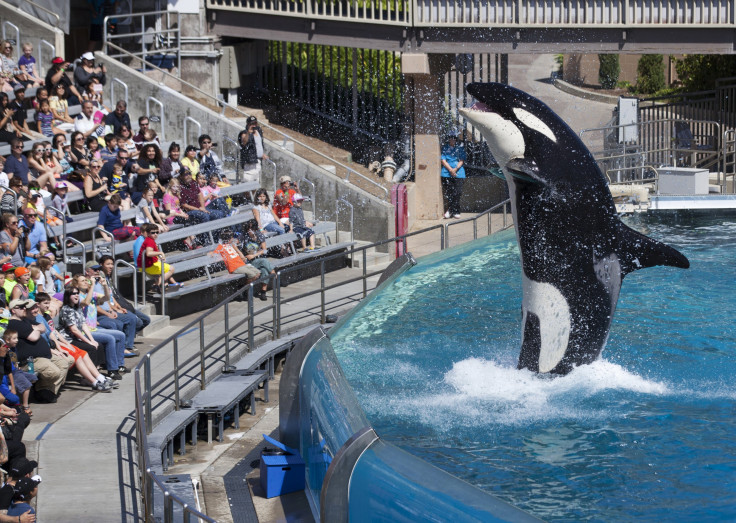SeaWorld Class-Action Lawsuit: 'Tell The Truth' About Orcas' Well-Being, Animal Rights Group Demands

SeaWorld's legal troubles show no signs of slowing: A new class-action lawsuit, this one filed in San Francisco, claims the theme park lies about the mental and physical well-being of its orcas, or killer whales. It is the third lawsuit filed against SeaWorld in the last month. The first was filed just a few days after SeaWorld launched an ambitious ad campaign to combat claims it mistreats the orcas. A California nonprofit environmental organization, the Earth Island Institute, is providing legal counsel to the plaintiffs, Marc Anderson and Ellexa Conway, two people who visited SeaWorld's park in San Diego. The EII wants “to force SeaWorld to tell the truth” about its orcas and its care of them.
The suit alleges SeaWorld violates two California advertising laws by profiting from false statements that “are misleading to reasonable consumers.” David Phillips, executive director of the International Marine Mammal Project for the EII, slammed SeaWorld in a statement Tuesday.
“If SeaWorld told the truth about the whales’ shortened and stressful lives in concrete tanks, and severe depression and boredom from sterile living conditions, no one would ever go there,” Phillips said. “Would people bring their children to SeaWorld if they knew the cruelty behind the orca whale circus show? We think not.”
In late March SeaWorld launched its print, air and online ad campaign featuring some of the theme park's veterinarians and trainers attesting to SeaWorld's care of orcas and refuting claims made by critics like that orcas in the wild live up to five times longer on average than those living at SeaWorld. SeaWorld stocks have dropped more than 36 percent in the last year, while attendance and revenue are also down, according to the San Diego Union-Tribune.
Those losses come after the release of the 2013 documentary Blackfish, a film focused on Tilikum, an orca linked to the death of three trainers. The film portrays the animal as having suffered from inhumane conditions. SeaWorld strongly denies the allegations in the film, which it calls “propaganda” created by animal rights activists masquerading as scientists.
A video from the new ad campaign refutes the claims in Blackfish, via the SeaWorld YouTube account:
Part of the ad campaign was a social media reach-out called Ask SeaWorld, which promised users that the theme park's vets and trainers would answer any questions they were asked, but the campaign was overrun by animal rights activists and other critics who flooded it with harsh criticisms and complaints.
Among other criticisms, the suit filed against SeaWorld on Tuesday points out the near-universal prevalence of dorsal fin collapse among SeaWorld’s captive orcas compared to a lower prevalence of the condition among wild orcas as evidence that captivity is harmful to SeaWorld’s orcas. Dorsal fin collapse involves the sagging to one side of an orca’s dorsal fin and is believed to be linked to captive orcas' reduced physical activity.
A class-action lawsuit filed in Florida Saturday alleges SeaWorld “drugs” its captive orcas and houses them in aquariums equivalent to “chemical bathtubs.” A separate suit was filed in March in San Diego.
The suit by Anderson and Conway was filed in the San Francisco Superior Court. The entire complaint can be found here, via the EII.
© Copyright IBTimes 2024. All rights reserved.





















